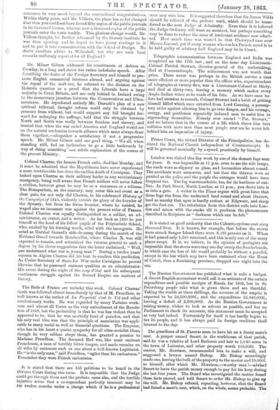Colonel Charras, the famous French exile, died last Monday, and
it must be admitted that the Republicans have never experienced a more irretrievable loss since the sudden death of Cavaignac. They looked upon Charras as their military leader in any revolutionary emergency, being well aware that French soldiers will never follow a civilian, however great he may be as a statesman or a tribune. The Bonapartist; on the contrary, may enter this sad event as a clear gain, for not only did Charras, in his celebrated History of the Campaign of 1815, violently tarnish the glory of the founder of the dynasty, but from the Swiss frontier, where he resided, he waged also an incessant war against the present ruler of France. Colonel Charms was equally distinguished as a soldier, an ad- ministrator, an orator, and a writer. As far back as 1830 he put himself at the head of his fellow pupils of the Polytechnic School, who, excited by his burning words, sided with the insurgents. He acted as Marshal Gerard's aide-de-camp during the march of the National Guard towards Rambouillet, where Charles X. was still expected to remain, and astonished the veteran general to such a degree by his clever suggestions that the latter exclaimed, " Well, you understand what war is, young man !" Daring a twelve years' sojourn in Algiers Charms did his best to confirm this prediction. As Under Secretary of State for War under Cavaignac he proved likewise that he possessed eminent qualities as an administrator. His arrest during the night of the coup d'etat and his subsequent continuous struggle against the Second Empire are matters of history.
































 Previous page
Previous page